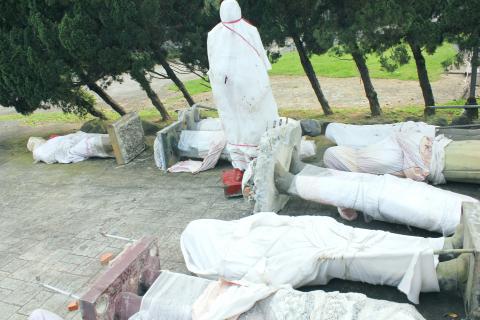Tainan Mayor William Lai (賴清德) yesterday defended his administration’s removal of Chiang Kai-shek (蔣介石) statues from city schools, saying the move was a step toward transitional justice by freeing students from political totems and restoring political neutrality on campuses.
His comments came a day after the Tainan City Government removed statues from 14 elementary and junior-high schools.
Some residents, including former Tainan county commissioner Su Huan-chih (蘇煥智), criticized the operation as “secretive” because the schools were not notified in advance, although they were told to take photographs as proof the statues were taken down after the removal teams arrived.

Photo: Lin Tzu-hsiang, Taipei Times
Su is a member of the Democratic Progressive Party (DPP), as is Lai.
“Must [the removals] be carried out in such an unthoughtful manner that may provoke conflicts,” Su wrote in a Facebook post.
However, Lai yesterday reminded critics that during events last month to mark the 68th anniversary of the 228 Incident, he said that the city government would remove statues and busts of Chiang from the city’s schools.
The city government did not inform school authorities of the exact date of the removal operation to avoid unnecessary conflicts or disturbing classes, he said.
The statues would be sent to Taoyuan’s Dasi District (大溪), he said.
The Cihu Memorial Sculpture Garden adjacent to Chiang’s mausoleum in Dasi has about 200 statues and busts of the former president that have been removed from schools, parks and other places around the nation since 2000.
Lai said the schools could decide for themselves how to use the space formerly occupied by a Chiang statue, and the city would subsidize their plans.
Meanwhile, Chinese Nationalist Party (KMT) Legislator Alex Tsai (蔡正元) and other party members criticized the Tainan City Government’s removal of the statues.
Tsai said it was another example of Lai’s tendency to rave about Japanese-related affairs.
“How can the greatness of Japan be demonstrated without renouncing Chiang Kei-shek?” Tsai said.
Lai does not understand that heaping praise on Japan at the expense of the Republic of China’s leadership might bring the nation to destruction instead of independence, the lawmaker said.
Hsieh Lung-chieh (謝龍介), head of the KMT’s Tainan chapter, said the removal of the statues was an attempt to purge an important historical figure from the public’s memory.
Chiang’s merits or failures should be openly discussed, but Lai is using his personal popularity and political views to polarize society, Hsieh said.
However, DPP Tainan City Councilor Chiu Li-li (邱莉莉) backed the city’s action, saying the Chiang statues were products of a totalitarian regime.
Schools are where knowledge and values are passed down, and only statues representing figures that have had a positive impact on society should be placed on campuses, she said.
Chiu’s colleague, DPP City Councilor Chen Yi-chen (陳怡珍), said the Chiang statues are symbols of an authoritarian regime, which should have been removed from the school campuses long ago.
Additional reporting by CNA

Alain Robert, known as the "French Spider-Man," praised Alex Honnold as exceptionally well-prepared after the US climber completed a free solo ascent of Taipei 101 yesterday. Robert said Honnold's ascent of the 508m-tall skyscraper in just more than one-and-a-half hours without using safety ropes or equipment was a remarkable achievement. "This is my life," he said in an interview conducted in French, adding that he liked the feeling of being "on the edge of danger." The 63-year-old Frenchman climbed Taipei 101 using ropes in December 2004, taking about four hours to reach the top. On a one-to-10 scale of difficulty, Robert said Taipei 101

A preclearance service to facilitate entry for people traveling to select airports in Japan would be available from Thursday next week to Feb. 25 at Taiwan Taoyuan International Airport, Taoyuan International Airport Corp (TIAC) said on Tuesday. The service was first made available to Taiwanese travelers throughout the winter vacation of 2024 and during the Lunar New Year holiday. In addition to flights to the Japanese cities of Hakodate, Asahikawa, Akita, Sendai, Niigata, Okayama, Takamatsu, Kumamoto and Kagoshima, the service would be available to travelers to Kobe and Oita. The service can be accessed by passengers of 15 flight routes operated by

Taiwanese and US defense groups are collaborating to introduce deployable, semi-autonomous manufacturing systems for drones and components in a boost to the nation’s supply chain resilience. Taiwan’s G-Tech Optroelectronics Corp subsidiary GTOC and the US’ Aerkomm Inc on Friday announced an agreement with fellow US-based Firestorm Lab to adopt the latter’s xCell, a technology featuring 3D printers fitted in 6.1m container units. The systems enable aerial platforms and parts to be produced in high volumes from dispersed nodes capable of rapid redeployment, to minimize the risk of enemy strikes and to meet field requirements, they said. Firestorm chief technology officer Ian Muceus said

MORE FALL: An investigation into one of Xi’s key cronies, part of a broader ‘anti-corruption’ drive, indicates that he might have a deep distrust in the military, an expert said China’s latest military purge underscores systemic risks in its shift from collective leadership to sole rule under Chinese President Xi Jinping (習近平), and could disrupt its chain of command and military capabilities, a national security official said yesterday. If decisionmaking within the Chinese Communist Party has become “irrational” under one-man rule, the Taiwan Strait and the regional situation must be approached with extreme caution, given unforeseen risks, they added. The anonymous official made the remarks as China’s Central Military Commission Vice Chairman Zhang Youxia (張又俠) and Joint Staff Department Chief of Staff Liu Zhenli (劉振立) were reportedly being investigated for suspected “serious